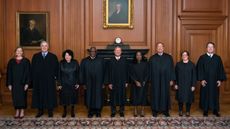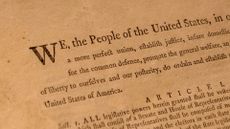Supreme Court places limits on state civil asset forfeiture


On Wednesday, the Supreme Court ruled 9-0 that constitutional protections against "excessive fines" extend to states through the 14th Amendment, placing limits on the ability of state and local police to seize and keep cars, cash, houses, and other assets used in the commission of crimes, even from people not accused of crimes. The practice, known as civil asset forfeiture, is a common and lucrative source of revenue for states and local governments, and it is frequently abused. The unanimous decision in the case, Timbs v. Indiana, won't end the practice but will allow people whose property was seized to argue in court that the amount taken was disproportionate to the crime.
"The historical and logical case for concluding that the 14th Amendment incorporates the Excessive Fines Clause is overwhelming," Justice Ruth Bader Ginsburg wrote for the eight-justice majority. (Justice Clarence Thomas wrote his own opinion.) "For good reason, the protection against excessive fines has been a constant shield throughout Anglo-American history: Exorbitant tolls undermine other constitutional liberties" and "can be used, for example, to retaliate against or chill the speech of political enemies."
In the case at hand, Indiana ordered small-time drug offender Tyson Timbs to pay $1,200 in fines and fees after pleading guilty to selling $225 of heroin, but they also seized his $42,000 Land Rover, arguing that even though he bought it with money from his father's life-insurance policy, he used it to commit crimes. "People are still going to lose their property without being convicted of a crime, they're still going to have their property seized," Wesley Hottot, a lawyer for Timbs, told The New York Times. "The new thing is that they can now say at the end of it all, whether I'm guilty or not, I can argue that it was excessive."
Subscribe to The Week
Escape your echo chamber. Get the facts behind the news, plus analysis from multiple perspectives.

Sign up for The Week's Free Newsletters
From our morning news briefing to a weekly Good News Newsletter, get the best of The Week delivered directly to your inbox.
From our morning news briefing to a weekly Good News Newsletter, get the best of The Week delivered directly to your inbox.
Create an account with the same email registered to your subscription to unlock access.
Sign up for Today's Best Articles in your inbox
A free daily email with the biggest news stories of the day – and the best features from TheWeek.com
Peter has worked as a news and culture writer and editor at The Week since the site's launch in 2008. He covers politics, world affairs, religion and cultural currents. His journalism career began as a copy editor at a financial newswire and has included editorial positions at The New York Times Magazine, Facts on File, and Oregon State University.
-
 'Test of faith for Trump Media's investors'
'Test of faith for Trump Media's investors'Today's Newspapers A roundup of the headlines from the US front pages
By The Week Staff Published
-
 Fallout: one of the 'most faithful – and best – video game adaptations'
Fallout: one of the 'most faithful – and best – video game adaptations'The Week Recommends This 'genre-bending' new Amazon series is set in a post-apocalyptic wilderness where survivors shelter below ground
By Adrienne Wyper, The Week UK Published
-
 Will Iran attack hinder support for Ukraine?
Will Iran attack hinder support for Ukraine?Today's Big Question Pro-Kyiv allies cry 'hypocrisy' and 'double standards' even as the US readies new support package
By Elliott Goat, The Week UK Published
-
 ATF finalizes rule to close 'gun show loophole'
ATF finalizes rule to close 'gun show loophole'Speed Read Biden moves to expand background checks for gun buyers
By Peter Weber, The Week US Published
-
 Hong Kong passes tough new security law
Hong Kong passes tough new security lawSpeed Read It will allow the government to further suppress all forms of dissent
By Peter Weber, The Week US Published
-
 France enshrines abortion rights in constitution
France enshrines abortion rights in constitutionspeed read It became the first country to make abortion a constitutional right
By Peter Weber, The Week US Published
-
 Texas executes man despite contested evidence
Texas executes man despite contested evidenceSpeed Read Texas rejected calls for a rehearing of Ivan Cantu's case amid recanted testimony and allegations of suppressed exculpatory evidence
By Peter Weber, The Week US Published
-
 Supreme Court wary of state social media regulations
Supreme Court wary of state social media regulationsSpeed Read A majority of justices appeared skeptical that Texas and Florida were lawfully protecting the free speech rights of users
By Peter Weber, The Week US Published
-
 Greece legalizes same-sex marriage
Greece legalizes same-sex marriageSpeed Read Greece becomes the first Orthodox Christian country to enshrine marriage equality in law
By Peter Weber, The Week US Published
-
 The pros and cons of a written constitution
The pros and cons of a written constitutionPros and Cons Clarity no substitute for flexibility, say defenders of Britain's unwritten rulebook
By The Week UK Published
-
 Trump and his lawyer Alina Habba have a rough day in defamation court
Trump and his lawyer Alina Habba have a rough day in defamation courtSpeed Read Trump's audible grousing as E. Jean Carroll testified earned him a warning he could be thrown out of court, and Habba showed she 'doesn't know what the hell she's doing'
By Peter Weber, The Week US Published